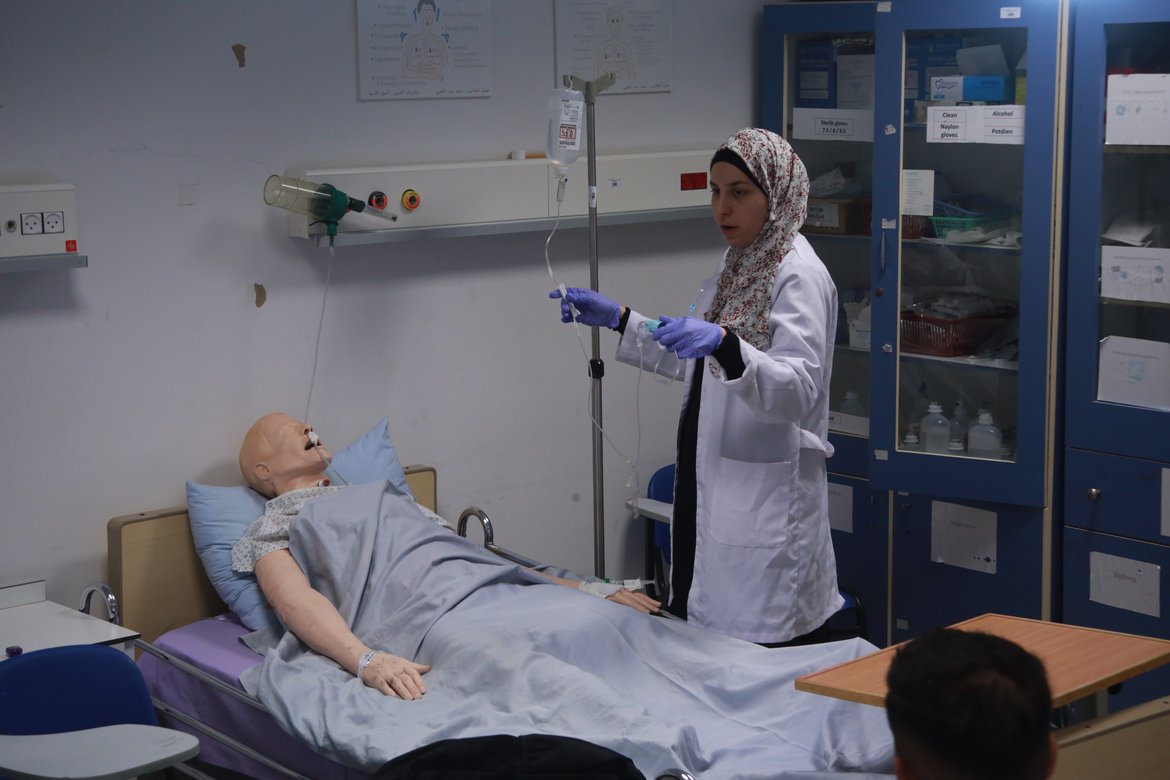The Fundamentals of Nursing Lab at the College of Nursing is designed to provide students with the essential skills and knowledge needed to deliver safe, effective, and compassionate nursing care. The lab serves as a cornerstone in the nursing curriculum, offering hands-on training in basic nursing techniques and procedures that form the foundation of nursing practice. Through simulated scenarios and practical exercises, students learn to apply theoretical concepts to real-life situations, building their confidence and competence as future healthcare providers.
To be a leading educational environment that instills in nursing students the core competencies required for safe, effective, and patient-centered care, ensuring they are well-prepared to meet the diverse needs of individuals in various healthcare settings.
The mission of the Fundamentals of Nursing Lab is to provide nursing students with the basic clinical skills, knowledge, and attitudes necessary to provide high-quality nursing care. By combining hands-on practice, simulation, and theoretical learning, the lab helps students develop the essential skills in patient assessment, hygiene, mobility, and communication, fostering a commitment to compassionate and evidence-based care.
- Basic Patient Care: Equip students with the necessary skills to provide fundamental patient care, including assistance with activities of daily living (ADLs), such as bathing, dressing, and feeding patients.
- Patient Assessment: Teach students to conduct basic patient assessments, including measuring vital signs (temperature, pulse, respiration, blood pressure), observing physical signs, and documenting patient conditions.
- Nursing Procedures: Train students to perform essential nursing procedures such as taking blood pressure, administering oral medications, and maintaining patient safety through proper positioning and lifting techniques.
- Infection Control: Instill the importance of infection prevention and control practices, including hand hygiene, personal protective equipment (PPE), and proper disposal of hazardous materials.
- Communication Skills: Develop students' communication skills, teaching them how to interact effectively with patients, families, and healthcare teams, focusing on active listening, empathy, and professionalism.
- Critical Thinking and Problem Solving: Encourage students to develop critical thinking skills by assessing patient needs, prioritizing care, and making informed decisions in a variety of clinical situations.
- Cultural Sensitivity: Promote cultural competence by helping students understand and respect diverse cultural values and practices in the context of patient care.
- Safety Practices: Ensure students understand the principles of patient safety, including fall prevention, safe medication administration, and the proper use of medical equipment.
The Fundamentals of Nursing Lab is equipped with modern simulation tools, mannequins, and medical equipment to provide students with an immersive learning experience. The lab's purpose is to bridge the gap between classroom learning and real-life patient care, offering students a supportive environment where they can practice and refine their nursing skills.
- Mannequins: allowing students to practice basic nursing procedures, such as taking vital signs, administering injections, and conducting physical assessments.
- Clinical Skills Stations: These stations focus on foundational nursing techniques, such as wound care, catheter insertion, respiratory care, and intravenous (IV) therapy. Students perform these procedures under the guidance of instructors, gaining hands-on experience in a controlled environment.
- Patient Care Scenarios: patient care scenarios allow students to practice responding to common nursing situations, such as assisting patients with hygiene, mobility, and comfort. These scenarios also foster the development of clinical decision-making and communication skills.
- Infection Control Practices: The lab includes dedicated spaces for practicing infection control procedures, including hand hygiene, donning and doffing personal protective equipment (PPE), and using antiseptics to prevent the spread of infection.
- Patient Safety and Mobility: Students learn essential patient safety practices, including fall prevention techniques, safe patient handling, and mobility assistance. The lab provides opportunities to practice proper lifting and positioning techniques, as well as managing patient transfers.
- Medical Equipment Training: The lab includes various pieces of medical equipment commonly used in basic nursing care, such as thermometers, blood pressure cuffs, stethoscopes, and pulse oximeters. Students gain experience using these devices to assess and monitor patient conditions.
- Communication and Documentation: Students practice documenting patient care in mock clinical charts, reinforcing the importance of accurate and thorough medical record-keeping. They also engage in role-playing exercises to develop effective communication skills with patients and healthcare teams.
- Instructor-Led Demonstrations and Feedback: Experienced nursing instructors provide demonstrations of nursing techniques and guide students as they practice their skills. Continuous feedback ensures that students develop proper techniques and understand the rationale behind each nursing intervention.
The Fundamentals of Nursing Lab is integral to developing the essential skills that nursing students need to provide safe, compassionate, and evidence-based care. Through consistent practice and instructor-led guidance, students build confidence and competence in performing a wide range of nursing tasks, preparing them for clinical placements and future nursing practice.
The lab also fosters a supportive learning environment where students can ask questions, receive feedback, and refine their skills before working with actual patients in healthcare settings.


